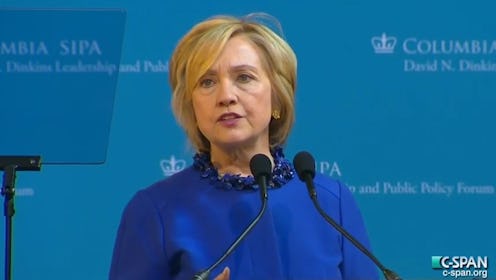News
Hillary Spoke Out Passionately On Baltimore

When you're a presidential candidate, no topic of the moment is off-limits. Democratic contender (and presumptive frontrunner) Hillary Clinton embraced that mindset Wednesday morning, in a speech at the David N. Dinkins Leadership and Public Policy Forum at Columbia University, and the results were pretty stirring — so why not take a look at the most powerful quotes from Hillary Clinton's speech on Baltimore and policy, and see what all the fuss is about?
Of course, everybody kind of knows the headlining, issue du jour right now — the state of minority policing and protest in America, as illustrated by the scenes in Baltimore, New York City, and Ferguson, Missouri that have played out over the last several months. The last two nights in particular have been pretty tragic, with a largely peaceful protest in Baltimore Monday giving way to a night of fire-starting and theft, and a sympathetic demonstration in Ferguson Tuesday night concluding with two civilians shot.
The instigating issue for all this tumult, of course, is the longstanding history of racial bias in policing — and the considerable legal deference police officers are often given in use of force cases — that afflicts countless minority communities, in cities both big and small. Speaking before the assembled crowd at Columbia, Clinton addressed the situation, offering a glimpse of how her campaign will be talking about race and justice.
It Should Tear At Our Soul
Clinton's speech had a considerable amount of moral force, expressing the urgency of the Black Lives Matter movement as a nearly spiritual stain on American life. And, with apparent emotion, she ran down a list (a brisk summarization, sad to say) of the victims of recent, high-profile police killings.
What we have seen in Baltimore should, indeed I think does, tear at our soul. From Ferguson, to Staten Island, to Baltimore, the patterns have become unmistakable and undeniable. Walter Scott, shot in the back in Charleston, South Carolina. Unarmed, in debt, terrified of spending more time in jail for child support payments he couldn't afford. Tamir Rice, shot in a park in Cleveland, Ohio, unarmed and just 12-years-old. Eric Garner, choked to death after being stopped for selling cigarettes on the streets of our city. And now, Freddie Gray, his spine nearly severed while in police custody.
Some Hard Truths
Clinton followed up her reflection on the deaths of Scott, Rice, Garner and Gray by laying down a challenge to the American public. Basically, we need to do better, pay more attention, grapple more seriously with our tortured legacy on race, both past and present.
We have to come to terms with some hard truths about race and justice in America. There is something profoundly wrong when African-American men are still far more likely to be stopped and searched by police, charged with crimes, and sentenced to longer prison terms than are meted out to their white counterparts. There is something wrong when a third of all black men face the prospect of prison during their lifetimes. And an estimated 1.5 million black men are quote, missing from their families and communities, because of incarceration and premature death.
Respect For The Law, And By The Law
Throughout her speech, Clinton weaved skillfully between acknowledging the perils of policing and the necessity of the law, while still making it clear that law enforcement has some things to answer to.
So the violence has to stop. But more broadly, let's remember that everyone in every community benefits when there is respect for the law, and when everyone in every community is respected by the law. That is what we have to work towards in Baltimore, and across our country.
Body Cameras Are Common Sense
Perhaps the most important part of the speech, however — of any political speech, really — was getting some details about specific policy prescriptions that a President Hillary Clinton might endorse. For example: police body cameras, and doing away with the heavy militarization that's washed over state and local police departments in the years following 9/11.
There are police departments already deploying creative and effective strategies, demonstrating how we can protect the public without resorting to unnecessary force. We need to learn from those examples, build on what works. We can start by making sure that federal funds for state and local law enforcement are used to bolster best practices, rather than buy weapons of war that have no place on our streets. ... We should make sure every police department in the country has body cameras to record interactions between officers on patrol and suspects. That will improve transparency and accountability, it will help protect good people on both sides of the lens. For every tragedy caught on tape, there surely have been many more that remained invisible, not every problem can be or will be prevented by cameras, but this is a common sense step we should take.
Simply put, this was probably the most substantive and important speech of her early presidential campaign, and it's worth watching all the way through. So if you've got the time, take a look at the video below (Clinton's remarks begin around the one-hour mark).
Image: C-SPAN